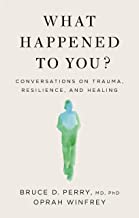Book review: What Happened to You by Oprah Winfrey and Dr. Bruce D. Perry
- angelgrey1969

- Mar 27, 2022
- 2 min read
Conversations on Trauma, Resilience, and Healing

This book starts out with making sense of the world where it explores the hierarchical organization of the human brain using an upside-down triangle to model four layers (brainstem, diencephalon, limbic, and cortex) representing the basic organization of the brain. Next up is seeking balance where Dr. Perry explores the impact of our early relational experiences on our self-regulation which is based on the Tree of Regulation (regulation, relationship, and reward).
Moving on to how we were loved which explores how what happens to a person as an infant has a profound impact on the capacity to love and be loved which revisits the concept of fight or flight. In the spectrum of trauma, Dr. Perry highlights the four symptom clusters of PTSD which are intrusive, avoidant, individual experiences change mood and thinking, and alteration in arousal and reactivity as the stress-response networks come overactive and overly reactive.
In connecting the dots, Dr. Perry explains that much of human invention and practices are transmissible, including the negative aspects of humankind, certain psychological traits, emotional characteristics, and behavior patterns. With coping to healing Oprah and Dr. Perry explore the manifestation of dissociation as a coping mechanism when stress-response systems are activated. He highlights the five states—calm, alert, alarm, fear, and terror—explaining how dissociation occurs when fight or flight is impossible. Also highlighted are why victims of abuse are usually drawn to situations where they are abused.
In post-traumatic wisdom, they discuss the misconception that children are resilient. He uses the metaphor of a hanger being bent and the inability to be returned to its original shape and the more it is bent and straightened the weak points finally break. They discuss the importance of connectedness in helping us achieve resilience or “bounce back.” Our brains, our biases, our systems explore trauma informed care and how language is getting in the way of progress by turning it into a buzzword. Relational hunger in the modern world focuses on how our world is relationally impoverished and that the disconnection makes us more vulnerable and that our ability to tolerate stressors is diminished because our connectedness is diminishing.
This book, written in interview format features a plethora of stories from both Oprah and Dr. Perry that shouldn’t be missed to get the overall knowledge. They aim at reframing our approach to trauma and understanding how important relational connectedness is in promoting healing. Read the book in its entirety by getting it here.
Until my next post, why not check out my YA novels about mental illness, memoir writing, novel in verse, or even my Native American mystery series on Amazon, or follow me on Twitter, Instagram, Facebook, Goodreads, LinkedIn, Bookbub , BookSprout, or AllAuthor.











Comments